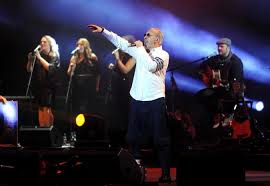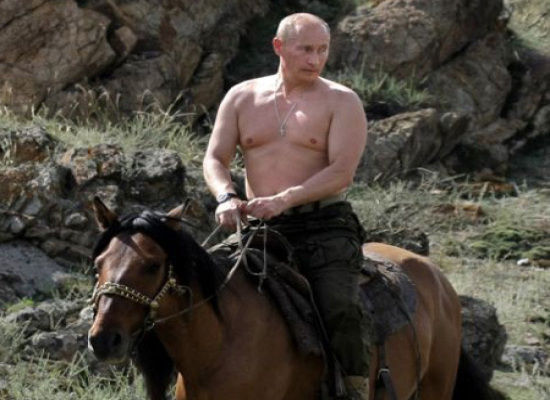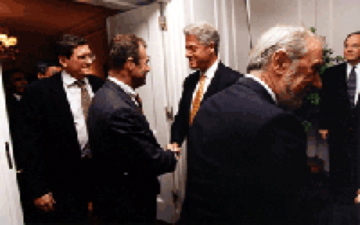The scent of nationalism was present in the former-Yugoslavia before Vladimir Putin effectively assumed power in Moscow. Already during the early stages of the conflict in Bosnia & Herzegovina, "BiH" solutions were being fashioned in the hope of, well appeasing is perhaps an appropriate term, those leaders in the region but also Moscow who saw feudal nationalism as the vehicle to replace authoritarian communism. As one of the negotiators that resulted in the so-called "Dayton-Paris Accords," (that delivered an end to conflict in Bosnia & Herzegovina, the role of Washington and European representatives was on the surface paramount as compared to that of Moscow's representatives. Nonetheless, the final agreement was designed to appeal to the Russian Federation's leadership. Perhaps such a motive was not undesirable, but the Russian leadership was already inclined toward manipulating a re-branded nationalism that openly aligned with the most virulent ethno-religious nationalism in the region. Perhaps in November 1995 when the Agreement was negotiated at Wright Air Force Base in Dayton, Ohio, the sacrifice of principle may have appeared a worthy trade-off in order to end a brutal conflict and genocide. Personally, my dilemma in signing the Dayton-Paris Accords in the end offered two bad options but at least one ended the killing and ethnic-cleansing with the added guarantee of the US and NATO. Unfortunately though, the imprint of nationalism upon the Dayton Accords became dominant through the flawed implementation of the agreements in a manner increasingly accommodating to a Putin-dominated Moscow and regional nationalist proxies.
Russia Encircled by NATO or a Europe Defined/Bounded by Putin?
The effect though is not limited to BiH or even the immediate region but has given rise to retrograde nationalist agendas from Western Europe to the post Berlin-Wall states of Eastern and Central Europe. This nationalism divides and undermines a progressive, more open and economically more coherent pan-European future and Euro-Atlantic partnership. The outward threats can also be traced to the failures in addressing the end of the conflict/genocide in BiH within a European framework: ISIS is in part fueled by the sense of selective application of European and American political and legal principles in BiH, a betrayal that now serves to rationalize a demand for more religious extremist defined answers. Putin's assault upon Ukraine, (as well as Georgia), and intimidation of other former Soviet and Warsaw Pact states follows the model set out in the former Yugoslavia and particularly the artificial divide of BiH under the pretext of ethnicity/religion. While Putin asserts in his defense that his aggressive military and political policies are only defensive to keep the Russian Federation from becoming encircled by the EU and NATO, the effect may be more accurately to girdle Europe, and its values of more open, free and democratic societies.
While negotiating in Dayton, at least some of us saw the effective implementation of American and European human rights and political values in a conflict where pluralism was under attack as the ultimate resolution beyond a mere end to immediate bloodshed. Offsetting the focus on territorial delineation and political domination embedded in ethnicity/religion, we saw the adoption of the principles of the Council of Europe and ultimately Euro-Atlantic integration as erasing both consequences and the manipulated causes of conflict. The prospect of entry into the European Union with visa-free borders, enhanced access to capital and trade, and the more established political stability was envisioned as perhaps a reintegrating factor for BiH and foundation for better regional relations. Where some ultra-nationalist Serbs (and perhaps Croats) rationalized war against a Muslim-led government in Sarajevo, BiH by appealing to religious prejudice and claiming that they were combating an Islamic threat on behalf of Western Christianity, Euro-Atlantic integration would seem to put to rest any such consideration, real or not.
Partnership with Putin over Membership in the EU?
The reality though has been to the contrary and disappointing for the vast majority of BiH citizens of all ethnicity. The ultra-nationalist Serb leadership in BiH which effectively wields a veto over the future of the entire country has blocked steps toward the country's entry into the EU as well as NATO. It has ignored and/or undermined rulings of the European Court of Human Rights and the Council of Europe. Partnership with Putin's agenda has been their fervent priority over EU membership, (at least in part to also perpetuate and shield cronyism and corruption.) Putin has been publicly honored for his conquest of Crimea and parts of Ukraine. Symbolism has taken on practical support as paramilitary units that had engaged in ethnic cleansing in BiH have migrated as volunteers to fight and ravage with the Putin-backed gangs and rebels. The ultra-nationalist link has been cultivated in both directions, and for well over two decades. During the early and mid-1990's conflict, Igor Strelkov, who initially boasted of shooting down MH17, had joined Serb paramilitaries in BiH and directly engaged in ethnic cleansing and other war crimes in BiH. The presumed motive was pan-Orthodox Christianity, however today many of the victims and those defending Ukraine sovereignty and territorial integrity are also Orthodox Christians. Just as with ISIS misusing Islam as a rallying cry, Christianity has been deployed by bandits posing as rebels from BiH to Ukraine.
Under Putin's Umbrella or in the European Club?
Putin sought to buy-off Ukraine's European ambitions before he resorted to promote a secessionist rebellion. Russian sources have come also to dominate investment in SE Europe and particularly those politically controlled by Serb ultra-nationalists leaderships. Such Russia-sourced investments may have a darker motivation in part: to deter Euro-Atlantic integration and bring these areas under Moscow's economic, political, and ultimately military umbrella.
The current Belgrade leadership is perhaps more nuanced, some might say playing both sides, or simply divided and ambivalent. While still presumably moving toward EU membership, some see it going beyond courting Putin to aligning with him in the current dispute with Europe - Serbia and Serb-dominated areas of BiH have ignored, even countered sanctions against Putin and his Moscow elite cronies. As was the case in Ukraine, the moment for deciding between Brussels or Moscow may come soon, as witnessed in Kiev earlier in 2014.
That the vision of an undivided Europe is in fundamental conflict with Putin's play for spheres of domination has come to be fully exposed. (See: Ukraine's Fight Is Europe's Battle) Even during Tito's communist era the former Yugoslavia was not under the dominion of the Soviet Union nor Imperial Russia prior to then. However, during the conflicts and negotiations that engulfed the former Yugoslavia two decades earlier, Moscow's representatives with US and European acquiescence promoted themselves as defenders of Orthodox Christian/Serb nationalist interests. Some Russian nationalist leaders including Vladimir Zhirinovsky, the noted anti-Semite and bigot, came to the hills surrounding Sarajevo to give "moral support" to the siege of Sarajevo that starved and killed thousands of children and innocent civilians and razed its architectural heritage that testified to centuries of diversity. It's probably not coincidental that the Russian Federation's, "RF", current Foreign Minister Sergei Lavrov and UN Ambassador Vitaly Churkin were then my counterparts at the UN and as Moscow's representatives for the former Yugoslavia respectively. As young aspiring politicos as much as diplomats, they promptly gripped onto a more nationalist agenda as means of personal advancement in the political scrum that the RF was in the 1990's.
Illusion/Hope for New Moscow Politics Facilitates Putin's Mythology:
The Clinton Administration had sought to make the post-Berlin-Wall Moscow more of a partner, a worthy goal in the "new world order" that most of us had hoped was dawning. In European capitals, talk was that if not directly as an EU member, the new RF could become real partner, perhaps even absorbing shared human rights and political freedom values. The lead US negotiator in Dayton, Ambassador Richard Holbrooke, saw his role beyond the talks on the future of the newly independent states of the former Yugoslavia and BiH, as a stepping stone to bigger political ambitions, Secretary of State along with a Nobel Peace Prize as brand. The then-EU mediator Carl Bildt only became a Moscow skeptic after climbing to role of Sweden's Foreign Minister, but his track record is expediency and self-interest. The European agenda in resolving BiH was clouded by bigotry toward Bosnian Muslims. Regardless that they are indigenous European Slavs, they were viewed as outsiders, particularly by France's Francois Mitterrand and the UK's Douglas Hurd.
The rights and wrongs of Dayton had little to do with the rule of law or justice in BiH and for that matter with US and/or presumed European political and human rights values, but more with a hope for a new Moscow that would be a part rather than apart from the western democracies. The illusion is now beyond salvation even as the reality needs to adapt to a fresh strategy/approach. Whether from ISIS or Beijing or Tehran or Moscow or some other less 'free society,' there is now a challenge to what human rights, free debate and democracy means each arguing that the definition applied by western democracies can be supplanted by their own interpretation on everything from religious pluralism and LGBT to free and fair elections and the open Internet. The most recent report on the strangulation of free media, minority and human rights in the post-Russia annexed Crimea evidences a darker dawn for the new Europe promoted by Putin and regime. (Read most recent Human Rights Watch Report on Crimea.)
For two decades, the US and EU have shied from confronting an ever more imperial Moscow leadership in its policies within Russia and along its borders. Legitimate grievances of the Chechen and other minorities were allowed to be brutally crushed with terror as a shared by-product. Georgia was and continues to be invaded without any substantive consequence for Moscow. The energy-producing states of Central Asia are ever more sucked into Putin's political and economic orbit. Was Putin allowed to effectively manipulate energy prices through proxy trading operations that also built up his personal wealth and those of his cronies? Did this give rise to the mythology of Putin and personality cult politics that serves as base for a relentless rule that crushes opposition and blinds as well as subjugates Russian citizens in a new imperial adventure? Open military conflict with Russia holds tremendous hazard for all but neither can democracies or neighbors look away. Military confrontation is not an option but silence to his war drums is only more likely to herald a conflict without bounds.
A Fresh Start to Still Unfinished Project of the "New Europe"
It is time within BiH and the region as a whole to quit debating what is the good or bad of the Dayton-Paris Accords but speak of a post-Dayton-BiH and region, and by extension a more proactive Europe defending its vision and future. The Putin-aligned Serb nationalists promote their agenda by entreating what they call a "Dayton Bosnia." The French and other European leaders have dropped the reference to Paris in the Dayton-Paris Accords, correctly surmising that what perpetuates now under the guise of an agreement is neither an accord for the future nor one that Europe can embrace - it is an embarrassment from which they seek to run but it is in their front yard and a consequence of their actions/inactions. Simply stated, Putin's agenda for a divided Europe was seeded in the division of Bosnia and most dangerously now echoes the tactics, crimes and strategies of "separatists" nationalists around the periphery and within.
-----------------------
"Diplomat-Artist" - Belgrade/Sarajevo Reconciliation:

Contrary to popular stereotyping, there is more shared than distrust and animosity. The peoples of the former Yugoslavia are brought closer by art, culture, music and even empathy. See the tremendous response of most neighbors toward each other, regardless of ethnicity (and toward animal) during this spring's devastating floods. (See: Blame it on Rio or Sarajevo?) Dino Merlin was seen by most Bosnians/Herzegovinians as a patriot whose music helped raise the sagging spirits during the long conflict and sieges of the 1990's. As a Bosnian Muslim he might be viewed with suspicion or even disdain by some Serbs, but he is also appreciated and respected as a musical artist in the region, Serbia included. The video linked below shows the response he received performing at Belgrade's premier arena, sold-out over several dates. Of course this speaks well of Dino's music. It says even more about Serbian audiences and our capacity to consume that which is shared even as past and present divisions stare us in the face. It also says much about the reservoir of goodwill and understanding that is available to build a new construct for relations in the region and Europe as a whole. DiplomatArtist.com helps define and project a future where art, culture, film, music, and sport are part of the new diplomatic dialogue also empowering each one of us as audience, artist, and global citizen.
LINK to Dino Merlin Arena Concert in Belgrade:
@MuhamedSacirbey
PHOTOS:
Courtesy of Huff Post: Macho Vladimir Putin
Personal Collection: Ambassador Richard Holbrooke, Foreign Minister Muhamed Sacirbey, & President Bill ClintonCourtesy of fashionbymarina.blogspot.com: Dino Merlin in concert


